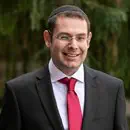
The head of the Oxfam International confederation of charities admitted that the organization's public spat with former celebrity ambassador Scarlett Johansson over her support of the Israeli company Sodastream was a mistake which cost the organization thousands of donors, the Guardian reported.
Mark Goldring made the comments at a seminar which addressed the issue of campaigning for “less popular causes.”
Johansson, who is Jewish, made commercials advertising Sodastream, an Israeli invention which allows consumers to carbonate their own beverages as opposed to buying soft drinks, in 2014. Her commercials appeared during the 2014 Superbowl. Oxfam opposed her association with Sodastream, as it had a factory in Mishor Adumim, located in Judea, at the time. The factory employed hundreds of Palestinian Arabs at higher wages than those paid in the Palestinian Authority.
"Oxfam is opposed to all trade from Israeli settlements, which are illegal under international law,” Oxfam said at the time. “We have made our concerns known to Ms. Johansson and we are now engaged in a dialogue on these important issues.”
Johansson refused to be pressured into cutting off ties with Sodastream. She released a statement which read: “SodaStream is a company that is not only committed to the environment but to building a bridge to peace between Israel and Palestine, supporting neighbors working alongside each other, receiving equal pay, equal benefits and equal rights."
Johansson severed her ties with Oxfam over what she termed "a fundamental difference of opinion in regards to the boycott, divestment and sanctions movement."
Goldring told the charity professionals at the seminar that Oxfam lost “literally thousands” of donors because of its spat with Johansson.
“The judgment was when to be proactive, when to be forceful, and when to be balanced and reflective,” Goldring said. “We got that wrong [in the case of Sodastream]."
Sodastream later closed its factory in Mishor Adumim due to the boycott of its products, putting hundreds of Arab employees out of work. It opened a new factory in the Negev, where it employs a large number of Bedouin.
